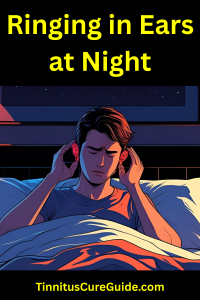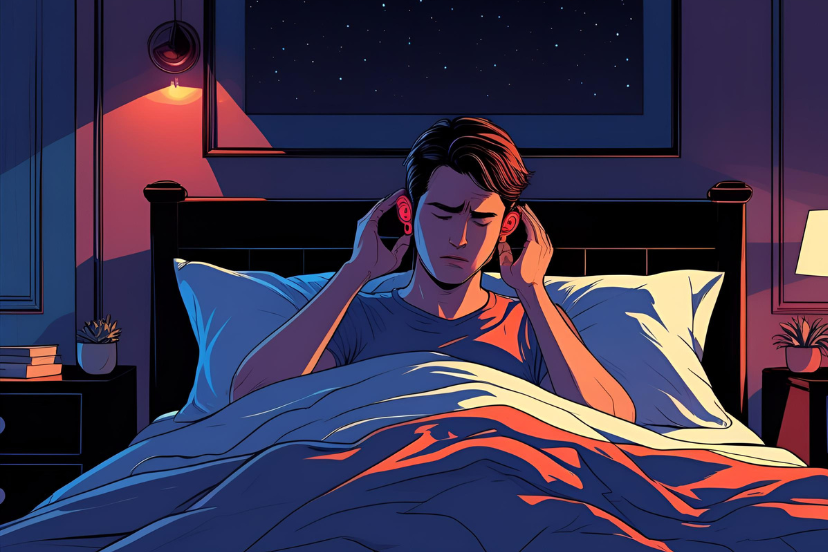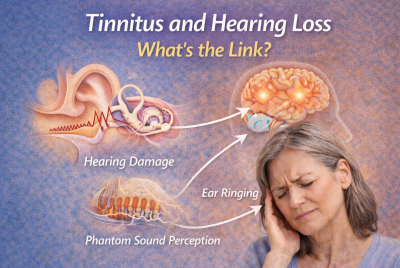Ringing in Ears at Night: Causes, Relief Tips, and When to See a Doctor
Ringing In Ears At Night – Why It Feels Louder And What You Can Do
If you’ve ever settled into bed expecting a quiet, peaceful night, only to notice ringing, buzzing, or whooshing sounds in your ears, you’re not alone. Millions of people experience ringing in ears at night — a form of tinnitus that becomes more noticeable when the world gets quiet.
During the day, background sounds like conversation, traffic, and music help mask tinnitus. At night, silence removes that masking effect, making internal sounds feel louder and harder to ignore. This can disrupt sleep, increase stress, and sometimes create a frustrating cycle where poor sleep makes tinnitus feel worse the next night.
In this guide, you’ll learn why tinnitus often feels louder at night, what causes it, how to manage it safely, and when medical evaluation may be important.
Quick Answer
Ringing in ears often feels louder at night because background noise is lower and the brain has fewer external sounds to focus on. Fatigue, stress, and quiet environments can increase awareness of tinnitus. In many cases, using gentle background sound and improving sleep habits can reduce how noticeable tinnitus feels.
Understanding Ringing In Ears At Night
Tinnitus is the perception of sound without an external source. It may sound like:
• High-pitched ringing
• Steady humming
• Pulsing or heartbeat-like sound
• Whooshing like wind or ocean waves
Nighttime tinnitus is often about perception, not necessarily worsening damage. When external noise drops, the brain becomes more aware of internal signals.
What This Often Feels Like In Real Life
Many people describe patterns like:
• Tinnitus is barely noticeable during busy daytime hours
• Ringing becomes obvious the moment they lie down
• Sound feels louder when trying to fall asleep
• Symptoms spike after stressful or exhausting days
Some also report:
• Worse tinnitus after poor sleep nights
• Louder ringing when sick, stressed, or dehydrated
• Improvement when background sound is present
These patterns often reflect brain awareness and nervous system sensitivity, not sudden ear damage.
Common Causes Of Ringing In Ears At Night
Noise Exposure
Loud concerts, power tools, or long headphone use can damage inner ear hair cells. Tinnitus often feels worse in silence after noise exposure.
Earwax Buildup
Wax blockage can change how sound enters the ear, increasing tinnitus perception.
Age-Related Hearing Changes
Age-related hearing loss can reduce external sound input, making tinnitus more noticeable at night.
Stress And Anxiety
Stress increases nervous system alertness and symptom awareness, especially at night.
Medical Or Circulation Related Conditions
Blood pressure issues, TMJ problems, and circulation changes can contribute to tinnitus symptoms.
Self Check: Is Your Nighttime Tinnitus Likely Perception-Related?
Night perception-related tinnitus often includes:
• Ringing is mainly noticeable in quiet rooms
• Improves with background sound
• Fluctuates with stress or sleep quality
• Present in both ears
Less typical patterns that may need evaluation include:
• Sudden new tinnitus
• Tinnitus only in one ear
• Tinnitus with dizziness or balance problems
• Tinnitus with sudden hearing change
Typical Pattern Of Nighttime Tinnitus Perception
During Stress Or Poor Sleep Periods
• Brain becomes more alert to internal signals
• Tinnitus feels louder
During Recovery Or Relaxed Periods
• The brain filters sound signals better
• Tinnitus is less noticeable
Long Term Pattern
• Many people learn coping strategies that reduce the impact
• Perception often becomes less distressing over time
Nighttime Tinnitus Vs Other Tinnitus Types
Night Perception Tinnitus
• Strongest in silence
• Improves with sound masking
• Often, stress is linked
Noise Damage Tinnitus
• Often constant
• May follow a loud event
• May not change much with background noise
Pulsatile Tinnitus
• Matches heartbeat
• Often needs medical evaluation
Why The Brain May Amplify Tinnitus At Night
The brain constantly filters sensory input. At night:
• External sound input drops
• The brain increases internal signal sensitivity
• Fatigue reduces filtering ability
• Stress hormones may increase awareness
This is why tinnitus may feel louder without actual physical worsening.
When Monitoring At Home Is Reasonable
• Symptoms mainly appear in quiet environments
• Tinnitus improves with background noise
• No hearing loss
• No dizziness
• Symptoms stable or improving
When Medical Evaluation Is Important
• Sudden tinnitus onset
• One-sided tinnitus
• Hearing loss
• Balance problems
• Pulsing tinnitus
• Ear pain or drainage
• Symptoms rapidly worsening
Treatment And Relief Options
Sound Support Strategies
• White noise machines
• Fans or soft background sound
• Sound therapy apps
• Low volume music or nature sounds
Sleep And Nervous System Support
• Deep breathing before bed
• Progressive muscle relaxation
• Consistent sleep schedule
• Limiting screen exposure before sleep
Medical Options
• Hearing aids with masking features
• Tinnitus sound therapy programs
• Cognitive behavioral therapy for stress response
• Medication review if tinnitus is a side effect
Expectation Vs Reality
Expectation:
Tinnitus should disappear completely if nothing is wrong.
Reality:
Many people learn to reduce the impact of tinnitus even if the sound is still present. Perception and distress level often improve.
Lifestyle Support For Long Term Tinnitus Control
• Protect hearing from loud noise
• Exercise for circulation
• Eat nutrient-rich foods
• Stay hydrated
• Manage stress consistently
Real Life Coping Strategies
• Using background sound while falling asleep
• Keeping a tinnitus trigger journal
• Practicing mindfulness or breathing exercises
• Using audiobooks or sound apps at low volume
Prevention Tips
• Follow safe headphone listening habits
• Manage stress daily
• Get regular hearing checkups
• Treat ear infections quickly
• Avoid sleeping in complete silence if tinnitus is severe
FAQs About Ringing In Ears At Night
Is Ringing In Ears At Night Permanent?
Not always. Many cases are related to perception changes or temporary triggers.
What Is The Best Sleep Position For Tinnitus?
Many people prefer back sleeping or sleeping with the affected ear facing upward.
Can Stress Make Tinnitus Worse At Night?
Yes. Stress increases brain alertness and symptom awareness.
Do Supplements Help Nighttime Tinnitus?
Some people explore magnesium, zinc, or herbal options. Results vary. Always talk to a healthcare provider first.
Should I See A Doctor For Nighttime Tinnitus?
Yes, if symptoms are sudden, worsening, or linked with hearing loss, dizziness, or pain.
Final Takeaway
Ringing in ears at night is often related to how the brain processes sound in quiet environments. While it can be frustrating, many people reduce its impact using sound therapy, stress management, and healthy sleep habits.
If symptoms change suddenly, worsen, or include other symptoms, medical evaluation is important. Many people find that with the right strategies, nighttime tinnitus becomes much easier to manage.
Disclaimer
This article is for informational purposes only and does not replace professional medical advice. Always consult a licensed healthcare provider for diagnosis and treatment decisions. Seek urgent medical care for sudden hearing loss, severe dizziness, or severe ear pain.

- When to See Doctor for Tinnitus
- Does Everyone Have Tinnitus In Silence
- The Cortisol and Tinnitus Connection






